An Analysis of Food Production and Sustainability Issues in Australia
VerifiedAdded on 2021/05/31
|9
|2206
|62
Essay
AI Summary
This essay critically examines the multifaceted issue of food production and sustainability within the Australian context. It begins by providing a comprehensive overview of food production, highlighting the various stakeholders involved, and defining sustainability in relation to agriculture. The core of the essay focuses on the economic, environmental, and social sustainability concerns specific to Australia's food production industry. Economically, it addresses the growing global demand for Australian food and its potential strain on resources. Environmentally, the essay investigates the impact of food production practices on the environment, including packaging, distribution, and the scarcity of water, as well as the lack of sufficient environmental policies. Socially, it explores the impact on indigenous communities, rural populations, and the social disparities arising from food production practices, including the displacement of farmers and the impact of mechanization. The essay concludes by offering recommendations for addressing these concerns, emphasizing the need for companies to contribute to global food stock, the adoption of organic farming practices, and the utilization of indigenous land for food production, as well as affordable prices for consumers.
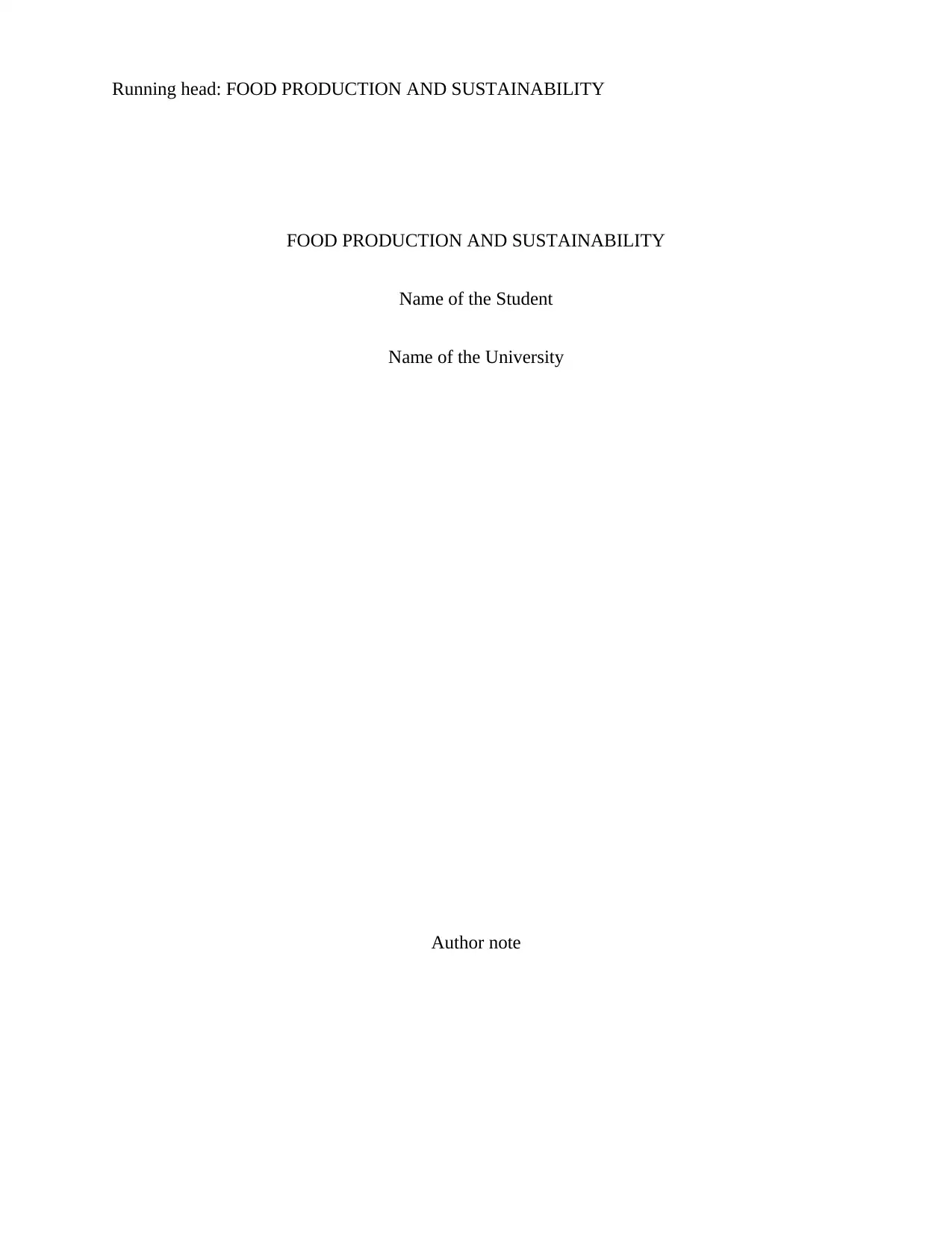
Running head: FOOD PRODUCTION AND SUSTAINABILITY
FOOD PRODUCTION AND SUSTAINABILITY
Name of the Student
Name of the University
Author note
FOOD PRODUCTION AND SUSTAINABILITY
Name of the Student
Name of the University
Author note
Paraphrase This Document
Need a fresh take? Get an instant paraphrase of this document with our AI Paraphraser
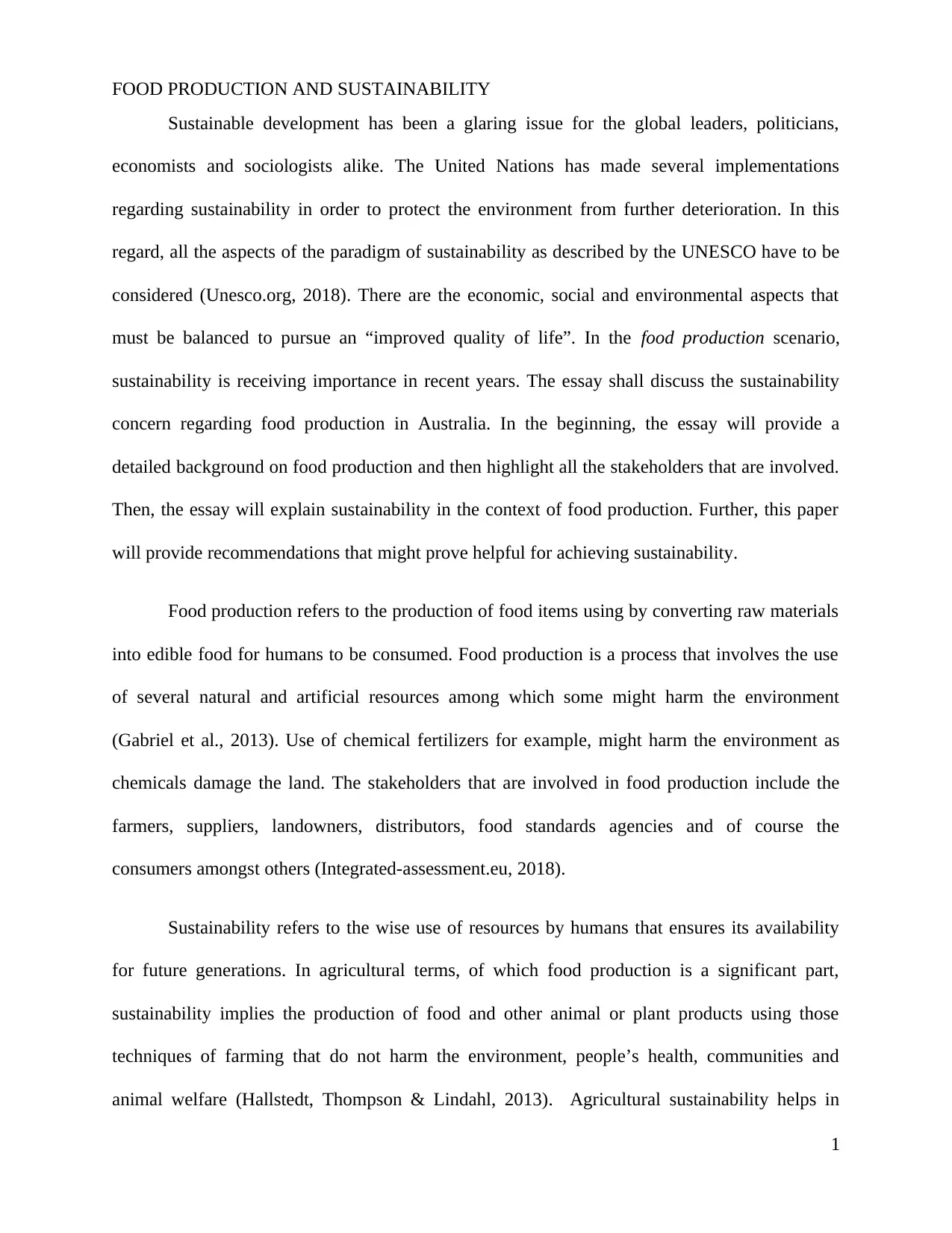
FOOD PRODUCTION AND SUSTAINABILITY
Sustainable development has been a glaring issue for the global leaders, politicians,
economists and sociologists alike. The United Nations has made several implementations
regarding sustainability in order to protect the environment from further deterioration. In this
regard, all the aspects of the paradigm of sustainability as described by the UNESCO have to be
considered (Unesco.org, 2018). There are the economic, social and environmental aspects that
must be balanced to pursue an “improved quality of life”. In the food production scenario,
sustainability is receiving importance in recent years. The essay shall discuss the sustainability
concern regarding food production in Australia. In the beginning, the essay will provide a
detailed background on food production and then highlight all the stakeholders that are involved.
Then, the essay will explain sustainability in the context of food production. Further, this paper
will provide recommendations that might prove helpful for achieving sustainability.
Food production refers to the production of food items using by converting raw materials
into edible food for humans to be consumed. Food production is a process that involves the use
of several natural and artificial resources among which some might harm the environment
(Gabriel et al., 2013). Use of chemical fertilizers for example, might harm the environment as
chemicals damage the land. The stakeholders that are involved in food production include the
farmers, suppliers, landowners, distributors, food standards agencies and of course the
consumers amongst others (Integrated-assessment.eu, 2018).
Sustainability refers to the wise use of resources by humans that ensures its availability
for future generations. In agricultural terms, of which food production is a significant part,
sustainability implies the production of food and other animal or plant products using those
techniques of farming that do not harm the environment, people’s health, communities and
animal welfare (Hallstedt, Thompson & Lindahl, 2013). Agricultural sustainability helps in
1
Sustainable development has been a glaring issue for the global leaders, politicians,
economists and sociologists alike. The United Nations has made several implementations
regarding sustainability in order to protect the environment from further deterioration. In this
regard, all the aspects of the paradigm of sustainability as described by the UNESCO have to be
considered (Unesco.org, 2018). There are the economic, social and environmental aspects that
must be balanced to pursue an “improved quality of life”. In the food production scenario,
sustainability is receiving importance in recent years. The essay shall discuss the sustainability
concern regarding food production in Australia. In the beginning, the essay will provide a
detailed background on food production and then highlight all the stakeholders that are involved.
Then, the essay will explain sustainability in the context of food production. Further, this paper
will provide recommendations that might prove helpful for achieving sustainability.
Food production refers to the production of food items using by converting raw materials
into edible food for humans to be consumed. Food production is a process that involves the use
of several natural and artificial resources among which some might harm the environment
(Gabriel et al., 2013). Use of chemical fertilizers for example, might harm the environment as
chemicals damage the land. The stakeholders that are involved in food production include the
farmers, suppliers, landowners, distributors, food standards agencies and of course the
consumers amongst others (Integrated-assessment.eu, 2018).
Sustainability refers to the wise use of resources by humans that ensures its availability
for future generations. In agricultural terms, of which food production is a significant part,
sustainability implies the production of food and other animal or plant products using those
techniques of farming that do not harm the environment, people’s health, communities and
animal welfare (Hallstedt, Thompson & Lindahl, 2013). Agricultural sustainability helps in
1
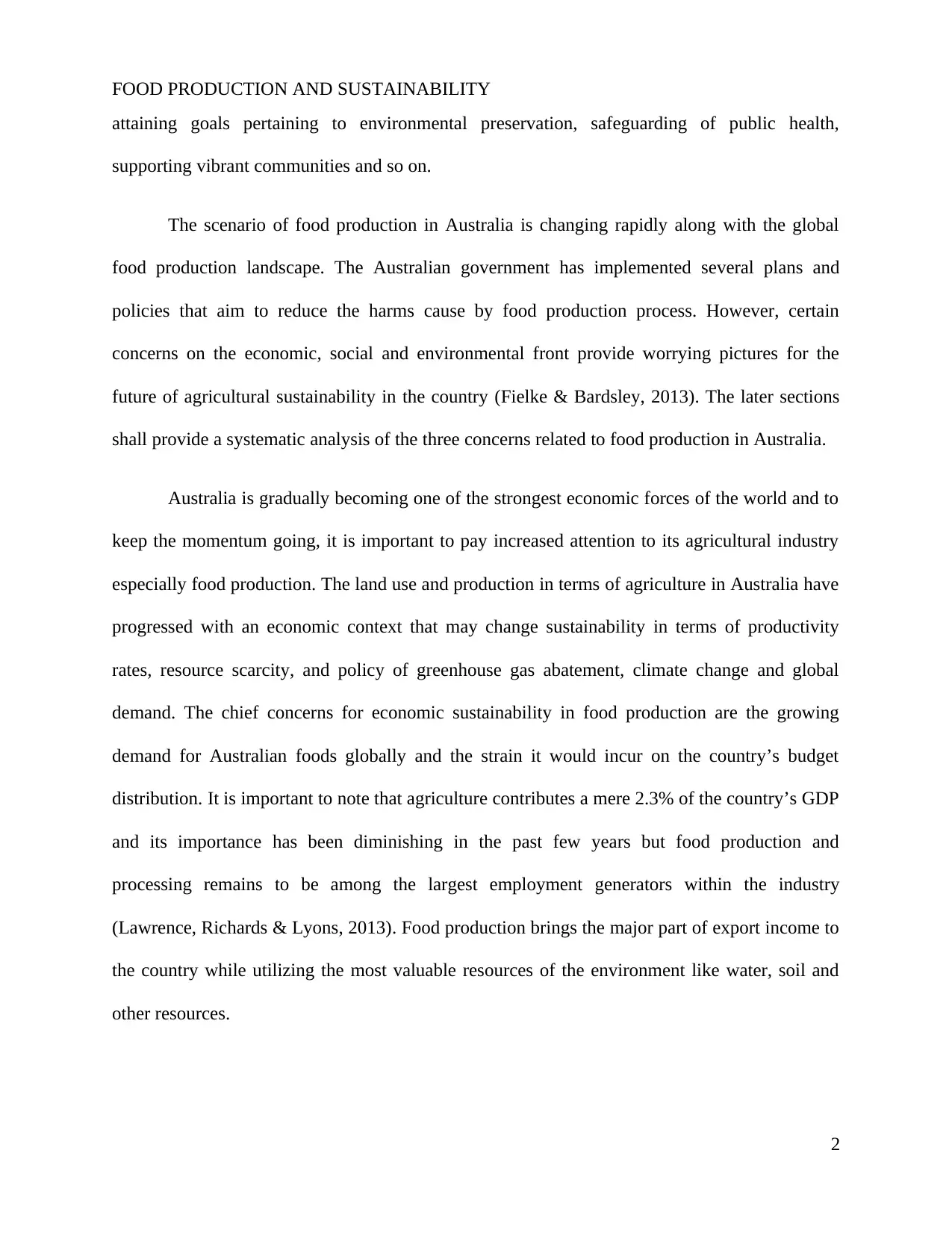
FOOD PRODUCTION AND SUSTAINABILITY
attaining goals pertaining to environmental preservation, safeguarding of public health,
supporting vibrant communities and so on.
The scenario of food production in Australia is changing rapidly along with the global
food production landscape. The Australian government has implemented several plans and
policies that aim to reduce the harms cause by food production process. However, certain
concerns on the economic, social and environmental front provide worrying pictures for the
future of agricultural sustainability in the country (Fielke & Bardsley, 2013). The later sections
shall provide a systematic analysis of the three concerns related to food production in Australia.
Australia is gradually becoming one of the strongest economic forces of the world and to
keep the momentum going, it is important to pay increased attention to its agricultural industry
especially food production. The land use and production in terms of agriculture in Australia have
progressed with an economic context that may change sustainability in terms of productivity
rates, resource scarcity, and policy of greenhouse gas abatement, climate change and global
demand. The chief concerns for economic sustainability in food production are the growing
demand for Australian foods globally and the strain it would incur on the country’s budget
distribution. It is important to note that agriculture contributes a mere 2.3% of the country’s GDP
and its importance has been diminishing in the past few years but food production and
processing remains to be among the largest employment generators within the industry
(Lawrence, Richards & Lyons, 2013). Food production brings the major part of export income to
the country while utilizing the most valuable resources of the environment like water, soil and
other resources.
2
attaining goals pertaining to environmental preservation, safeguarding of public health,
supporting vibrant communities and so on.
The scenario of food production in Australia is changing rapidly along with the global
food production landscape. The Australian government has implemented several plans and
policies that aim to reduce the harms cause by food production process. However, certain
concerns on the economic, social and environmental front provide worrying pictures for the
future of agricultural sustainability in the country (Fielke & Bardsley, 2013). The later sections
shall provide a systematic analysis of the three concerns related to food production in Australia.
Australia is gradually becoming one of the strongest economic forces of the world and to
keep the momentum going, it is important to pay increased attention to its agricultural industry
especially food production. The land use and production in terms of agriculture in Australia have
progressed with an economic context that may change sustainability in terms of productivity
rates, resource scarcity, and policy of greenhouse gas abatement, climate change and global
demand. The chief concerns for economic sustainability in food production are the growing
demand for Australian foods globally and the strain it would incur on the country’s budget
distribution. It is important to note that agriculture contributes a mere 2.3% of the country’s GDP
and its importance has been diminishing in the past few years but food production and
processing remains to be among the largest employment generators within the industry
(Lawrence, Richards & Lyons, 2013). Food production brings the major part of export income to
the country while utilizing the most valuable resources of the environment like water, soil and
other resources.
2
⊘ This is a preview!⊘
Do you want full access?
Subscribe today to unlock all pages.

Trusted by 1+ million students worldwide
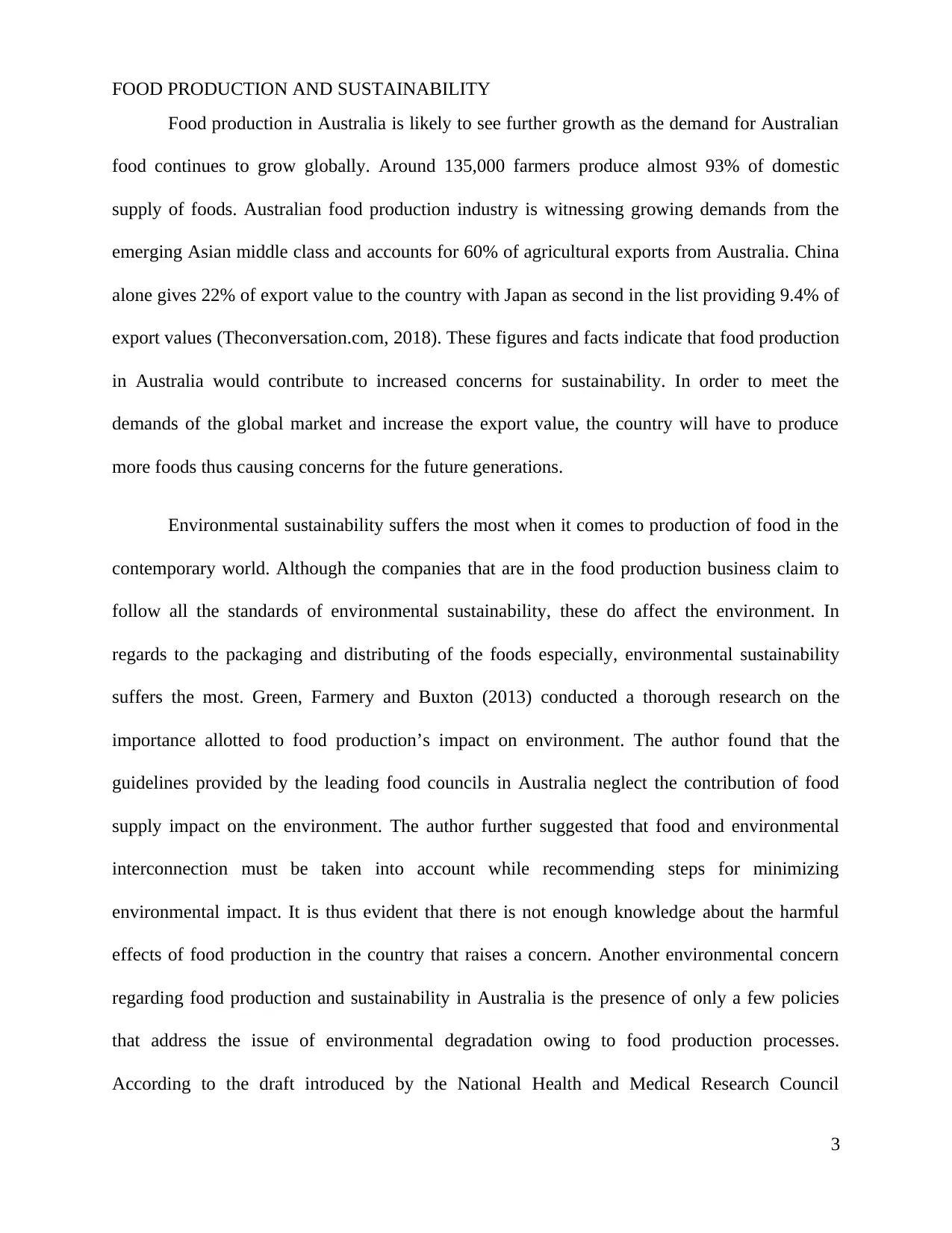
FOOD PRODUCTION AND SUSTAINABILITY
Food production in Australia is likely to see further growth as the demand for Australian
food continues to grow globally. Around 135,000 farmers produce almost 93% of domestic
supply of foods. Australian food production industry is witnessing growing demands from the
emerging Asian middle class and accounts for 60% of agricultural exports from Australia. China
alone gives 22% of export value to the country with Japan as second in the list providing 9.4% of
export values (Theconversation.com, 2018). These figures and facts indicate that food production
in Australia would contribute to increased concerns for sustainability. In order to meet the
demands of the global market and increase the export value, the country will have to produce
more foods thus causing concerns for the future generations.
Environmental sustainability suffers the most when it comes to production of food in the
contemporary world. Although the companies that are in the food production business claim to
follow all the standards of environmental sustainability, these do affect the environment. In
regards to the packaging and distributing of the foods especially, environmental sustainability
suffers the most. Green, Farmery and Buxton (2013) conducted a thorough research on the
importance allotted to food production’s impact on environment. The author found that the
guidelines provided by the leading food councils in Australia neglect the contribution of food
supply impact on the environment. The author further suggested that food and environmental
interconnection must be taken into account while recommending steps for minimizing
environmental impact. It is thus evident that there is not enough knowledge about the harmful
effects of food production in the country that raises a concern. Another environmental concern
regarding food production and sustainability in Australia is the presence of only a few policies
that address the issue of environmental degradation owing to food production processes.
According to the draft introduced by the National Health and Medical Research Council
3
Food production in Australia is likely to see further growth as the demand for Australian
food continues to grow globally. Around 135,000 farmers produce almost 93% of domestic
supply of foods. Australian food production industry is witnessing growing demands from the
emerging Asian middle class and accounts for 60% of agricultural exports from Australia. China
alone gives 22% of export value to the country with Japan as second in the list providing 9.4% of
export values (Theconversation.com, 2018). These figures and facts indicate that food production
in Australia would contribute to increased concerns for sustainability. In order to meet the
demands of the global market and increase the export value, the country will have to produce
more foods thus causing concerns for the future generations.
Environmental sustainability suffers the most when it comes to production of food in the
contemporary world. Although the companies that are in the food production business claim to
follow all the standards of environmental sustainability, these do affect the environment. In
regards to the packaging and distributing of the foods especially, environmental sustainability
suffers the most. Green, Farmery and Buxton (2013) conducted a thorough research on the
importance allotted to food production’s impact on environment. The author found that the
guidelines provided by the leading food councils in Australia neglect the contribution of food
supply impact on the environment. The author further suggested that food and environmental
interconnection must be taken into account while recommending steps for minimizing
environmental impact. It is thus evident that there is not enough knowledge about the harmful
effects of food production in the country that raises a concern. Another environmental concern
regarding food production and sustainability in Australia is the presence of only a few policies
that address the issue of environmental degradation owing to food production processes.
According to the draft introduced by the National Health and Medical Research Council
3
Paraphrase This Document
Need a fresh take? Get an instant paraphrase of this document with our AI Paraphraser
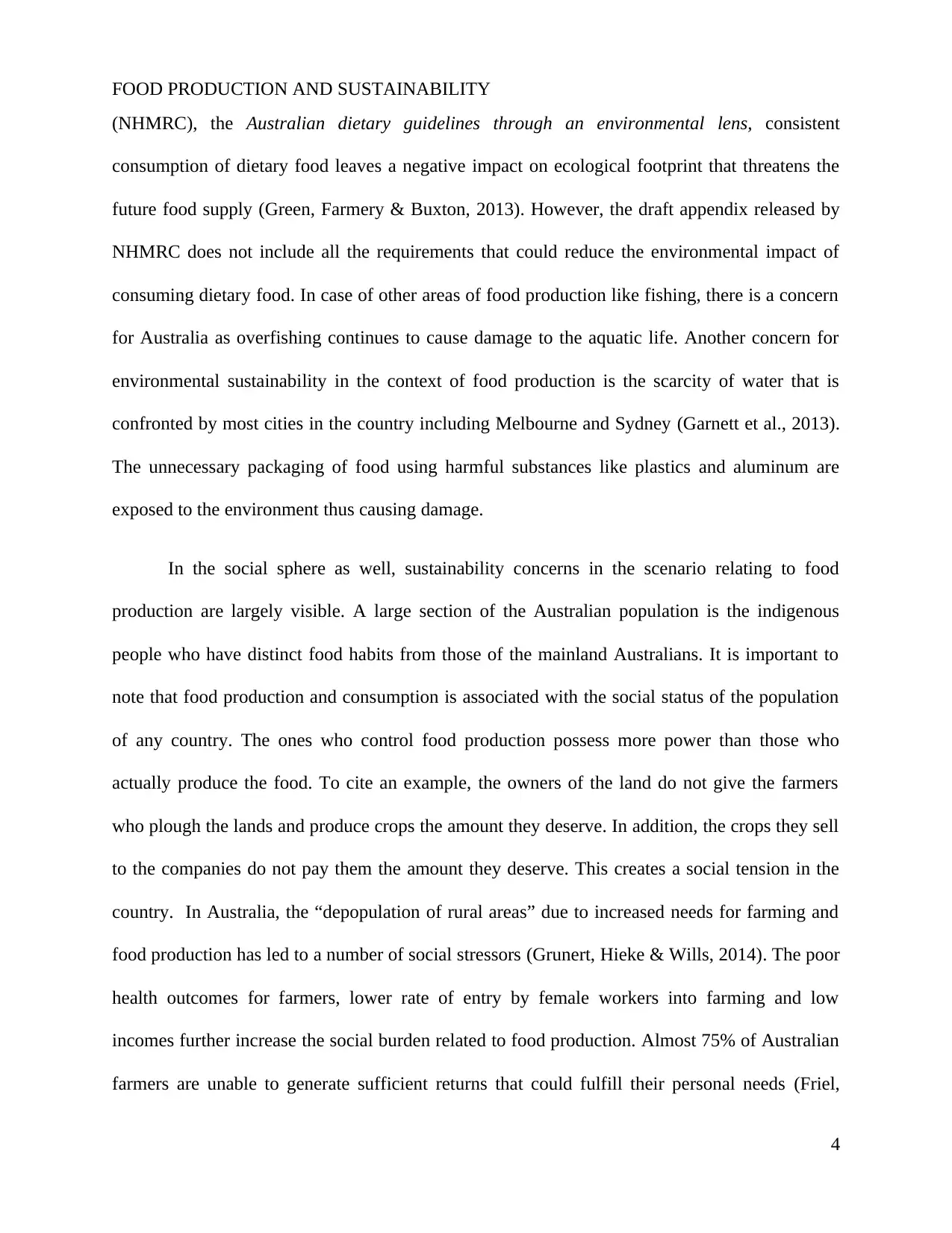
FOOD PRODUCTION AND SUSTAINABILITY
(NHMRC), the Australian dietary guidelines through an environmental lens, consistent
consumption of dietary food leaves a negative impact on ecological footprint that threatens the
future food supply (Green, Farmery & Buxton, 2013). However, the draft appendix released by
NHMRC does not include all the requirements that could reduce the environmental impact of
consuming dietary food. In case of other areas of food production like fishing, there is a concern
for Australia as overfishing continues to cause damage to the aquatic life. Another concern for
environmental sustainability in the context of food production is the scarcity of water that is
confronted by most cities in the country including Melbourne and Sydney (Garnett et al., 2013).
The unnecessary packaging of food using harmful substances like plastics and aluminum are
exposed to the environment thus causing damage.
In the social sphere as well, sustainability concerns in the scenario relating to food
production are largely visible. A large section of the Australian population is the indigenous
people who have distinct food habits from those of the mainland Australians. It is important to
note that food production and consumption is associated with the social status of the population
of any country. The ones who control food production possess more power than those who
actually produce the food. To cite an example, the owners of the land do not give the farmers
who plough the lands and produce crops the amount they deserve. In addition, the crops they sell
to the companies do not pay them the amount they deserve. This creates a social tension in the
country. In Australia, the “depopulation of rural areas” due to increased needs for farming and
food production has led to a number of social stressors (Grunert, Hieke & Wills, 2014). The poor
health outcomes for farmers, lower rate of entry by female workers into farming and low
incomes further increase the social burden related to food production. Almost 75% of Australian
farmers are unable to generate sufficient returns that could fulfill their personal needs (Friel,
4
(NHMRC), the Australian dietary guidelines through an environmental lens, consistent
consumption of dietary food leaves a negative impact on ecological footprint that threatens the
future food supply (Green, Farmery & Buxton, 2013). However, the draft appendix released by
NHMRC does not include all the requirements that could reduce the environmental impact of
consuming dietary food. In case of other areas of food production like fishing, there is a concern
for Australia as overfishing continues to cause damage to the aquatic life. Another concern for
environmental sustainability in the context of food production is the scarcity of water that is
confronted by most cities in the country including Melbourne and Sydney (Garnett et al., 2013).
The unnecessary packaging of food using harmful substances like plastics and aluminum are
exposed to the environment thus causing damage.
In the social sphere as well, sustainability concerns in the scenario relating to food
production are largely visible. A large section of the Australian population is the indigenous
people who have distinct food habits from those of the mainland Australians. It is important to
note that food production and consumption is associated with the social status of the population
of any country. The ones who control food production possess more power than those who
actually produce the food. To cite an example, the owners of the land do not give the farmers
who plough the lands and produce crops the amount they deserve. In addition, the crops they sell
to the companies do not pay them the amount they deserve. This creates a social tension in the
country. In Australia, the “depopulation of rural areas” due to increased needs for farming and
food production has led to a number of social stressors (Grunert, Hieke & Wills, 2014). The poor
health outcomes for farmers, lower rate of entry by female workers into farming and low
incomes further increase the social burden related to food production. Almost 75% of Australian
farmers are unable to generate sufficient returns that could fulfill their personal needs (Friel,
4
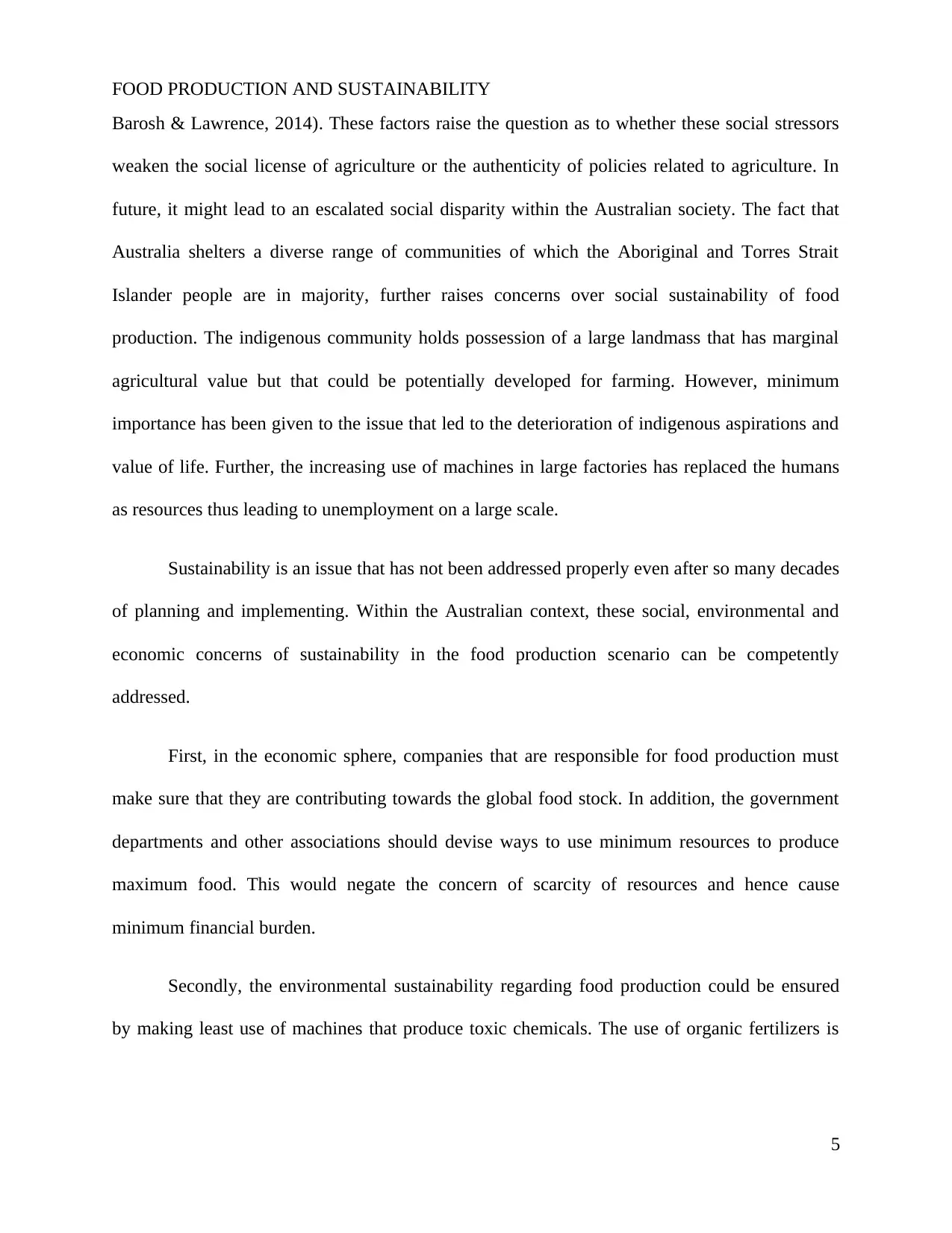
FOOD PRODUCTION AND SUSTAINABILITY
Barosh & Lawrence, 2014). These factors raise the question as to whether these social stressors
weaken the social license of agriculture or the authenticity of policies related to agriculture. In
future, it might lead to an escalated social disparity within the Australian society. The fact that
Australia shelters a diverse range of communities of which the Aboriginal and Torres Strait
Islander people are in majority, further raises concerns over social sustainability of food
production. The indigenous community holds possession of a large landmass that has marginal
agricultural value but that could be potentially developed for farming. However, minimum
importance has been given to the issue that led to the deterioration of indigenous aspirations and
value of life. Further, the increasing use of machines in large factories has replaced the humans
as resources thus leading to unemployment on a large scale.
Sustainability is an issue that has not been addressed properly even after so many decades
of planning and implementing. Within the Australian context, these social, environmental and
economic concerns of sustainability in the food production scenario can be competently
addressed.
First, in the economic sphere, companies that are responsible for food production must
make sure that they are contributing towards the global food stock. In addition, the government
departments and other associations should devise ways to use minimum resources to produce
maximum food. This would negate the concern of scarcity of resources and hence cause
minimum financial burden.
Secondly, the environmental sustainability regarding food production could be ensured
by making least use of machines that produce toxic chemicals. The use of organic fertilizers is
5
Barosh & Lawrence, 2014). These factors raise the question as to whether these social stressors
weaken the social license of agriculture or the authenticity of policies related to agriculture. In
future, it might lead to an escalated social disparity within the Australian society. The fact that
Australia shelters a diverse range of communities of which the Aboriginal and Torres Strait
Islander people are in majority, further raises concerns over social sustainability of food
production. The indigenous community holds possession of a large landmass that has marginal
agricultural value but that could be potentially developed for farming. However, minimum
importance has been given to the issue that led to the deterioration of indigenous aspirations and
value of life. Further, the increasing use of machines in large factories has replaced the humans
as resources thus leading to unemployment on a large scale.
Sustainability is an issue that has not been addressed properly even after so many decades
of planning and implementing. Within the Australian context, these social, environmental and
economic concerns of sustainability in the food production scenario can be competently
addressed.
First, in the economic sphere, companies that are responsible for food production must
make sure that they are contributing towards the global food stock. In addition, the government
departments and other associations should devise ways to use minimum resources to produce
maximum food. This would negate the concern of scarcity of resources and hence cause
minimum financial burden.
Secondly, the environmental sustainability regarding food production could be ensured
by making least use of machines that produce toxic chemicals. The use of organic fertilizers is
5
⊘ This is a preview!⊘
Do you want full access?
Subscribe today to unlock all pages.

Trusted by 1+ million students worldwide
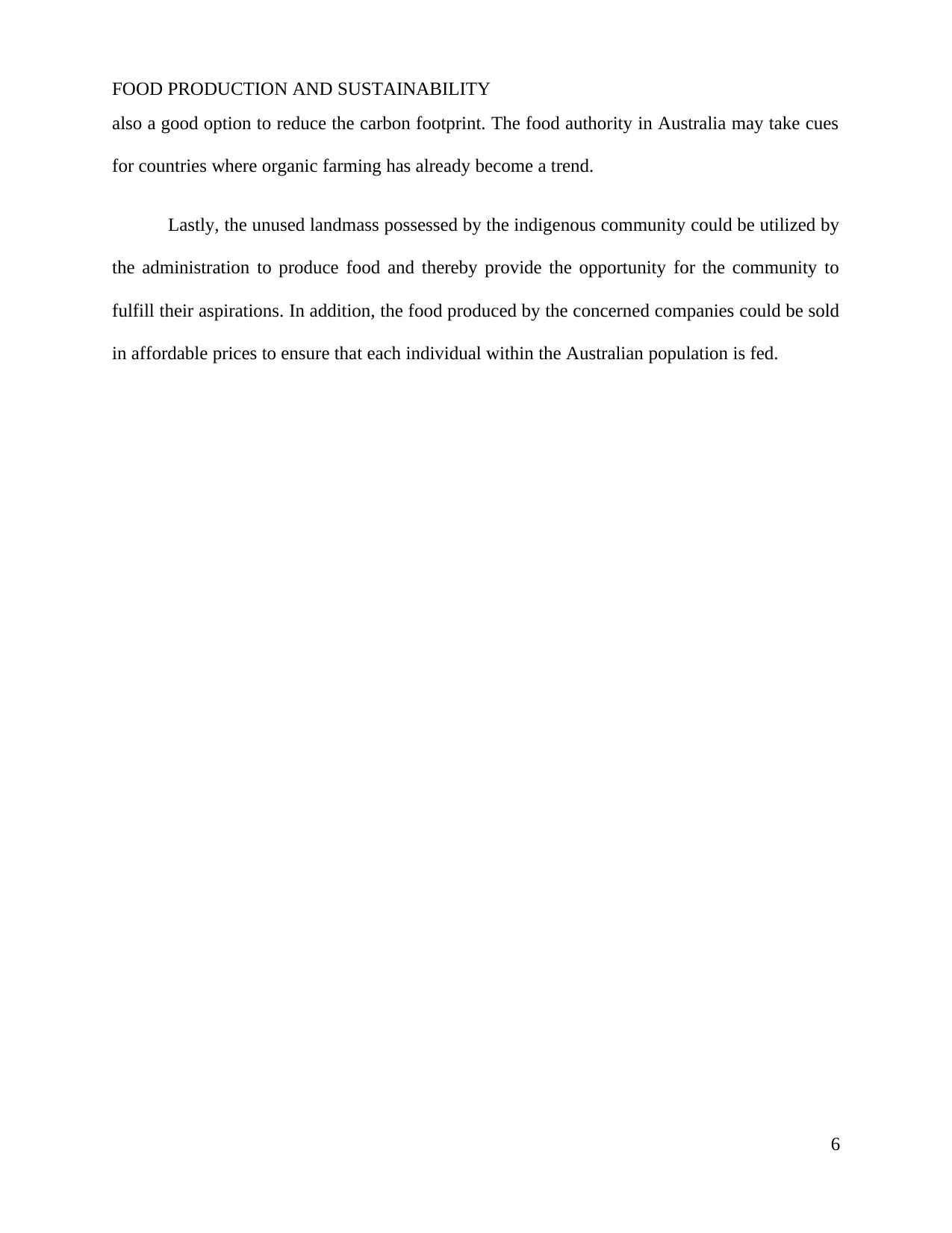
FOOD PRODUCTION AND SUSTAINABILITY
also a good option to reduce the carbon footprint. The food authority in Australia may take cues
for countries where organic farming has already become a trend.
Lastly, the unused landmass possessed by the indigenous community could be utilized by
the administration to produce food and thereby provide the opportunity for the community to
fulfill their aspirations. In addition, the food produced by the concerned companies could be sold
in affordable prices to ensure that each individual within the Australian population is fed.
6
also a good option to reduce the carbon footprint. The food authority in Australia may take cues
for countries where organic farming has already become a trend.
Lastly, the unused landmass possessed by the indigenous community could be utilized by
the administration to produce food and thereby provide the opportunity for the community to
fulfill their aspirations. In addition, the food produced by the concerned companies could be sold
in affordable prices to ensure that each individual within the Australian population is fed.
6
Paraphrase This Document
Need a fresh take? Get an instant paraphrase of this document with our AI Paraphraser
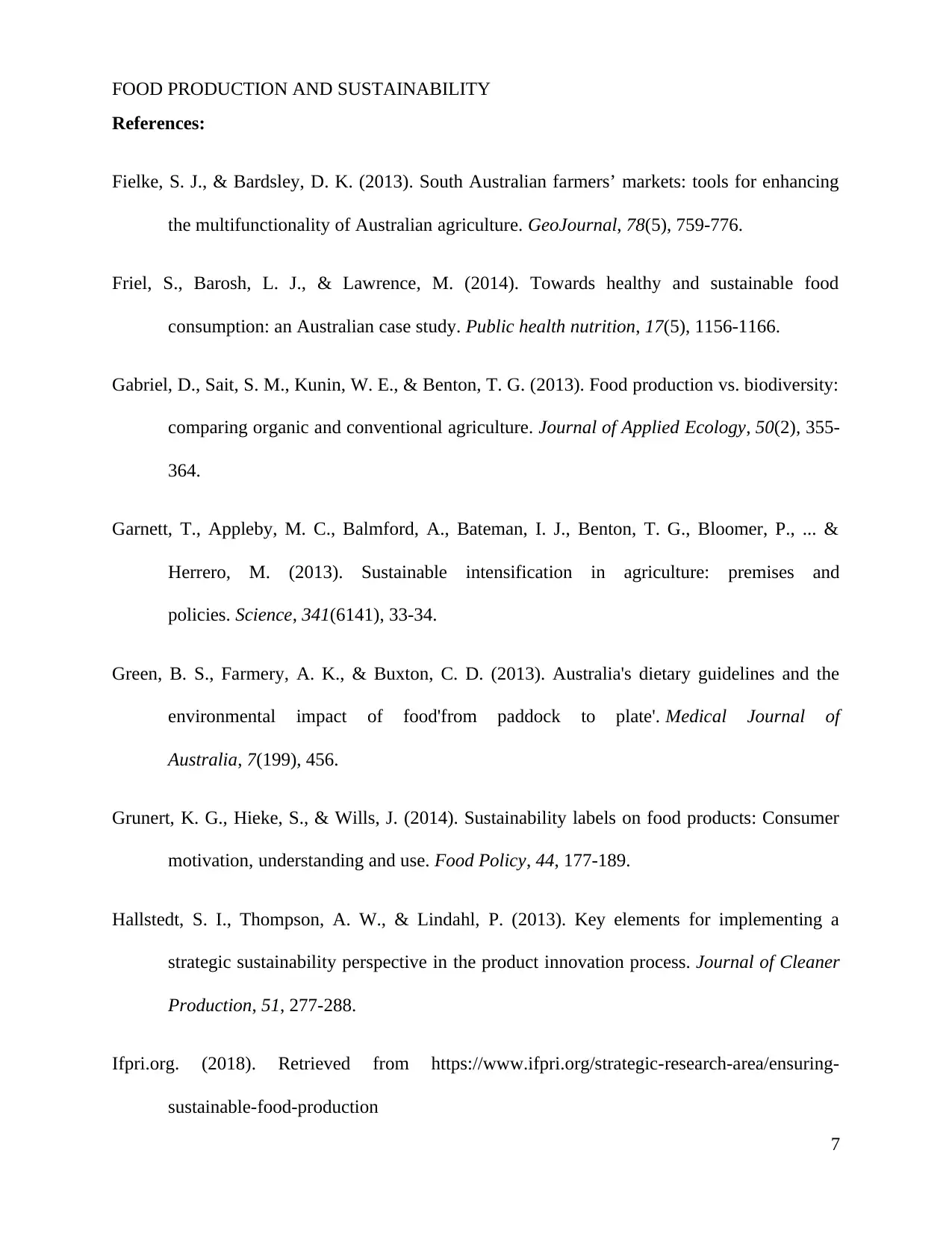
FOOD PRODUCTION AND SUSTAINABILITY
References:
Fielke, S. J., & Bardsley, D. K. (2013). South Australian farmers’ markets: tools for enhancing
the multifunctionality of Australian agriculture. GeoJournal, 78(5), 759-776.
Friel, S., Barosh, L. J., & Lawrence, M. (2014). Towards healthy and sustainable food
consumption: an Australian case study. Public health nutrition, 17(5), 1156-1166.
Gabriel, D., Sait, S. M., Kunin, W. E., & Benton, T. G. (2013). Food production vs. biodiversity:
comparing organic and conventional agriculture. Journal of Applied Ecology, 50(2), 355-
364.
Garnett, T., Appleby, M. C., Balmford, A., Bateman, I. J., Benton, T. G., Bloomer, P., ... &
Herrero, M. (2013). Sustainable intensification in agriculture: premises and
policies. Science, 341(6141), 33-34.
Green, B. S., Farmery, A. K., & Buxton, C. D. (2013). Australia's dietary guidelines and the
environmental impact of food'from paddock to plate'. Medical Journal of
Australia, 7(199), 456.
Grunert, K. G., Hieke, S., & Wills, J. (2014). Sustainability labels on food products: Consumer
motivation, understanding and use. Food Policy, 44, 177-189.
Hallstedt, S. I., Thompson, A. W., & Lindahl, P. (2013). Key elements for implementing a
strategic sustainability perspective in the product innovation process. Journal of Cleaner
Production, 51, 277-288.
Ifpri.org. (2018). Retrieved from https://www.ifpri.org/strategic-research-area/ensuring-
sustainable-food-production
7
References:
Fielke, S. J., & Bardsley, D. K. (2013). South Australian farmers’ markets: tools for enhancing
the multifunctionality of Australian agriculture. GeoJournal, 78(5), 759-776.
Friel, S., Barosh, L. J., & Lawrence, M. (2014). Towards healthy and sustainable food
consumption: an Australian case study. Public health nutrition, 17(5), 1156-1166.
Gabriel, D., Sait, S. M., Kunin, W. E., & Benton, T. G. (2013). Food production vs. biodiversity:
comparing organic and conventional agriculture. Journal of Applied Ecology, 50(2), 355-
364.
Garnett, T., Appleby, M. C., Balmford, A., Bateman, I. J., Benton, T. G., Bloomer, P., ... &
Herrero, M. (2013). Sustainable intensification in agriculture: premises and
policies. Science, 341(6141), 33-34.
Green, B. S., Farmery, A. K., & Buxton, C. D. (2013). Australia's dietary guidelines and the
environmental impact of food'from paddock to plate'. Medical Journal of
Australia, 7(199), 456.
Grunert, K. G., Hieke, S., & Wills, J. (2014). Sustainability labels on food products: Consumer
motivation, understanding and use. Food Policy, 44, 177-189.
Hallstedt, S. I., Thompson, A. W., & Lindahl, P. (2013). Key elements for implementing a
strategic sustainability perspective in the product innovation process. Journal of Cleaner
Production, 51, 277-288.
Ifpri.org. (2018). Retrieved from https://www.ifpri.org/strategic-research-area/ensuring-
sustainable-food-production
7
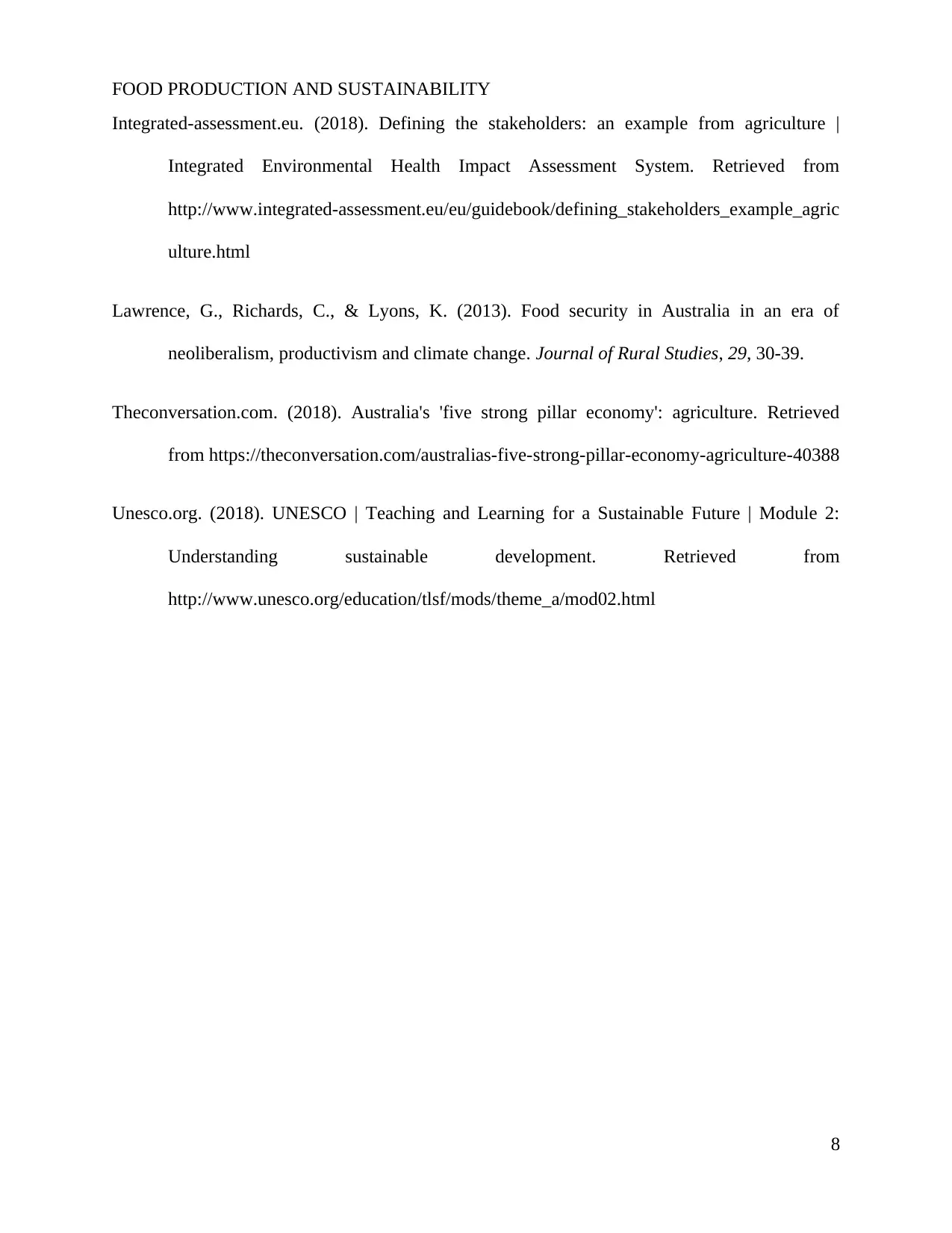
FOOD PRODUCTION AND SUSTAINABILITY
Integrated-assessment.eu. (2018). Defining the stakeholders: an example from agriculture |
Integrated Environmental Health Impact Assessment System. Retrieved from
http://www.integrated-assessment.eu/eu/guidebook/defining_stakeholders_example_agric
ulture.html
Lawrence, G., Richards, C., & Lyons, K. (2013). Food security in Australia in an era of
neoliberalism, productivism and climate change. Journal of Rural Studies, 29, 30-39.
Theconversation.com. (2018). Australia's 'five strong pillar economy': agriculture. Retrieved
from https://theconversation.com/australias-five-strong-pillar-economy-agriculture-40388
Unesco.org. (2018). UNESCO | Teaching and Learning for a Sustainable Future | Module 2:
Understanding sustainable development. Retrieved from
http://www.unesco.org/education/tlsf/mods/theme_a/mod02.html
8
Integrated-assessment.eu. (2018). Defining the stakeholders: an example from agriculture |
Integrated Environmental Health Impact Assessment System. Retrieved from
http://www.integrated-assessment.eu/eu/guidebook/defining_stakeholders_example_agric
ulture.html
Lawrence, G., Richards, C., & Lyons, K. (2013). Food security in Australia in an era of
neoliberalism, productivism and climate change. Journal of Rural Studies, 29, 30-39.
Theconversation.com. (2018). Australia's 'five strong pillar economy': agriculture. Retrieved
from https://theconversation.com/australias-five-strong-pillar-economy-agriculture-40388
Unesco.org. (2018). UNESCO | Teaching and Learning for a Sustainable Future | Module 2:
Understanding sustainable development. Retrieved from
http://www.unesco.org/education/tlsf/mods/theme_a/mod02.html
8
⊘ This is a preview!⊘
Do you want full access?
Subscribe today to unlock all pages.

Trusted by 1+ million students worldwide
1 out of 9
Related Documents
Your All-in-One AI-Powered Toolkit for Academic Success.
+13062052269
info@desklib.com
Available 24*7 on WhatsApp / Email
![[object Object]](/_next/static/media/star-bottom.7253800d.svg)
Unlock your academic potential
Copyright © 2020–2026 A2Z Services. All Rights Reserved. Developed and managed by ZUCOL.





